Business & Corporation Law: Contract Law and Remoteness Analysis
VerifiedAdded on 2023/04/19
|12
|3360
|258
Essay
AI Summary
This essay delves into the principle of remoteness of damages in contract law, particularly within the context of business and corporation law. It analyzes key cases such as Victoria Laundry Windsor v Newman Industries, Parsons (Livestock) Ltd v Uttley Ingham & Co Ltd, Hadley v Baxendale, and Transfield Shipping Inc v Mercator Shipping Inc, highlighting the conflicts and evolving tests for determining remoteness. The essay discusses the common law rules and the importance of foreseeability and the intention of the parties in assessing damages. The document is contributed by a student and available on Desklib, a platform offering a range of AI-based study tools and resources for students.
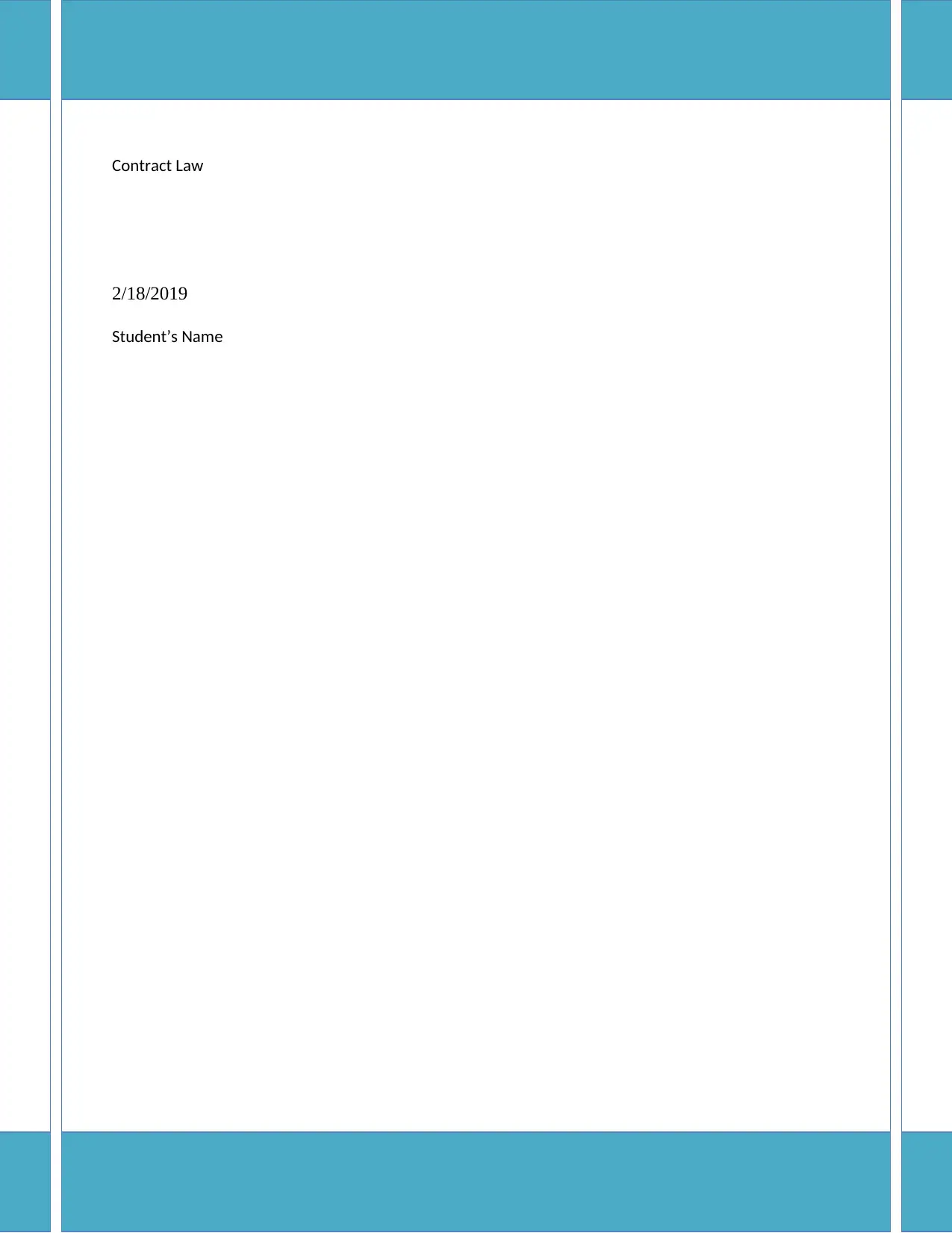
Running Head: BUSINESS AND CORPORATION LAW 0
Contract Law
2/18/2019
Student’s Name
Contract Law
2/18/2019
Student’s Name
Paraphrase This Document
Need a fresh take? Get an instant paraphrase of this document with our AI Paraphraser
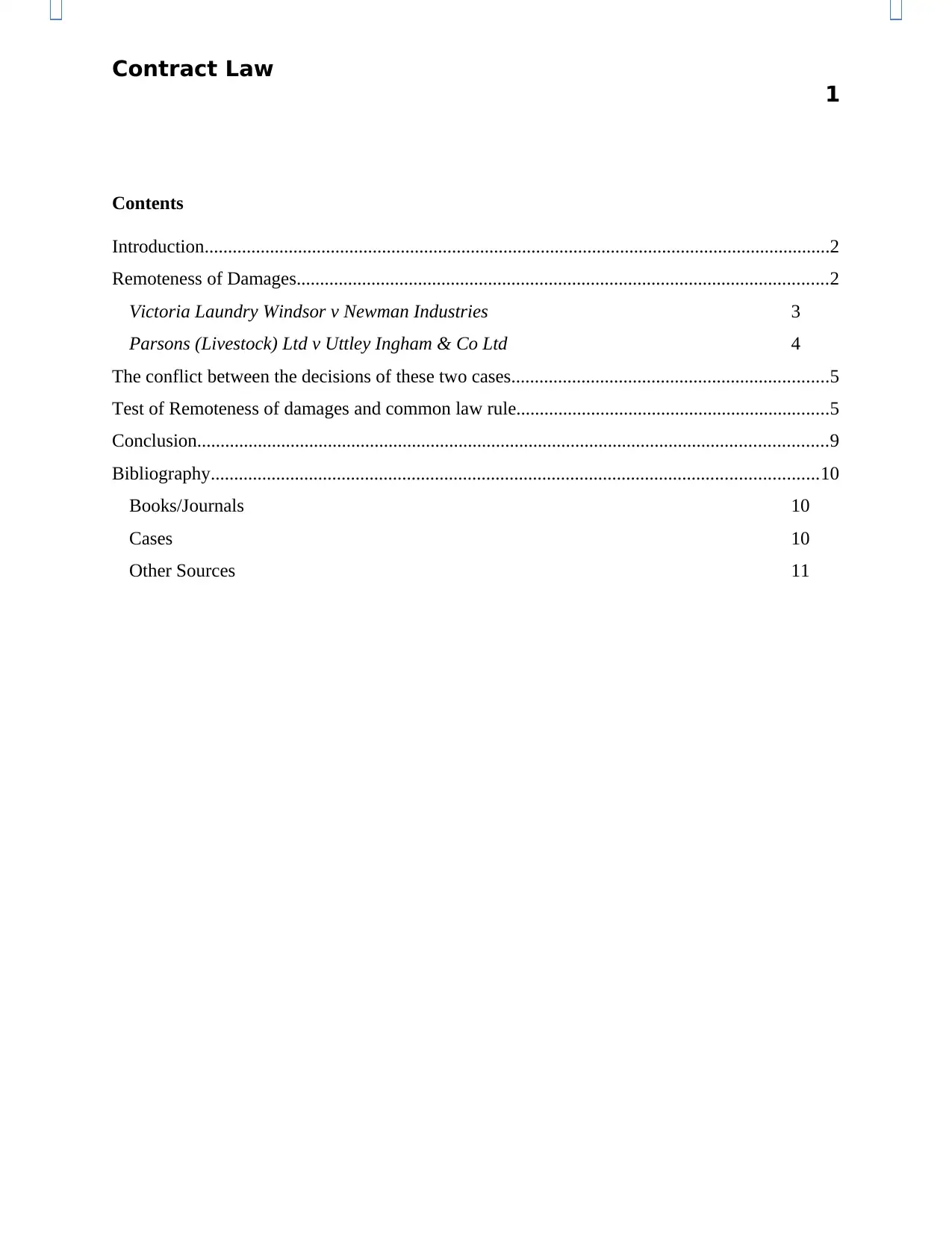
Contract Law
1
Contents
Introduction......................................................................................................................................2
Remoteness of Damages..................................................................................................................2
Victoria Laundry Windsor v Newman Industries 3
Parsons (Livestock) Ltd v Uttley Ingham & Co Ltd 4
The conflict between the decisions of these two cases....................................................................5
Test of Remoteness of damages and common law rule...................................................................5
Conclusion.......................................................................................................................................9
Bibliography..................................................................................................................................10
Books/Journals 10
Cases 10
Other Sources 11
1
Contents
Introduction......................................................................................................................................2
Remoteness of Damages..................................................................................................................2
Victoria Laundry Windsor v Newman Industries 3
Parsons (Livestock) Ltd v Uttley Ingham & Co Ltd 4
The conflict between the decisions of these two cases....................................................................5
Test of Remoteness of damages and common law rule...................................................................5
Conclusion.......................................................................................................................................9
Bibliography..................................................................................................................................10
Books/Journals 10
Cases 10
Other Sources 11
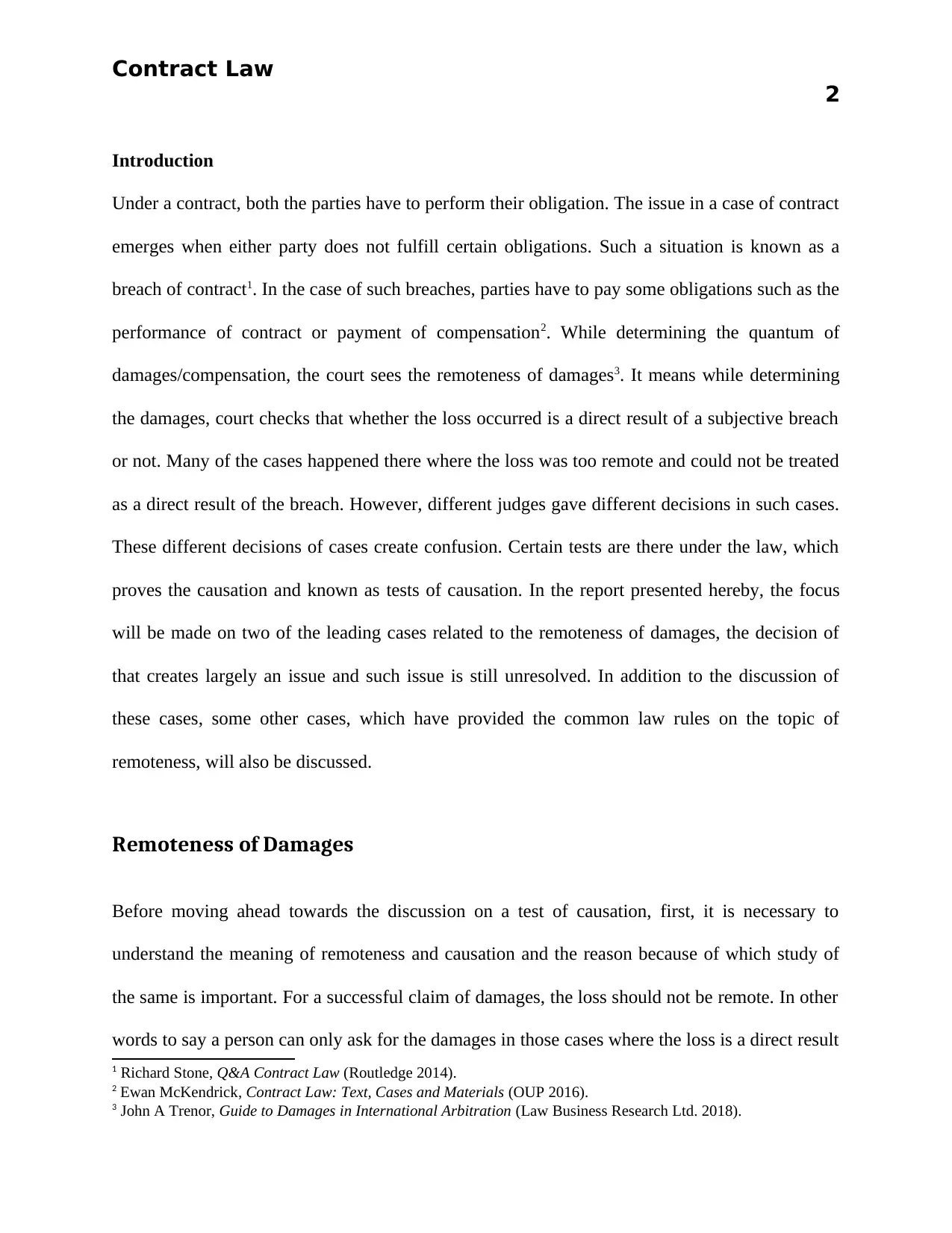
Contract Law
2
Introduction
Under a contract, both the parties have to perform their obligation. The issue in a case of contract
emerges when either party does not fulfill certain obligations. Such a situation is known as a
breach of contract1. In the case of such breaches, parties have to pay some obligations such as the
performance of contract or payment of compensation2. While determining the quantum of
damages/compensation, the court sees the remoteness of damages3. It means while determining
the damages, court checks that whether the loss occurred is a direct result of a subjective breach
or not. Many of the cases happened there where the loss was too remote and could not be treated
as a direct result of the breach. However, different judges gave different decisions in such cases.
These different decisions of cases create confusion. Certain tests are there under the law, which
proves the causation and known as tests of causation. In the report presented hereby, the focus
will be made on two of the leading cases related to the remoteness of damages, the decision of
that creates largely an issue and such issue is still unresolved. In addition to the discussion of
these cases, some other cases, which have provided the common law rules on the topic of
remoteness, will also be discussed.
Remoteness of Damages
Before moving ahead towards the discussion on a test of causation, first, it is necessary to
understand the meaning of remoteness and causation and the reason because of which study of
the same is important. For a successful claim of damages, the loss should not be remote. In other
words to say a person can only ask for the damages in those cases where the loss is a direct result
1 Richard Stone, Q&A Contract Law (Routledge 2014).
2 Ewan McKendrick, Contract Law: Text, Cases and Materials (OUP 2016).
3 John A Trenor, Guide to Damages in International Arbitration (Law Business Research Ltd. 2018).
2
Introduction
Under a contract, both the parties have to perform their obligation. The issue in a case of contract
emerges when either party does not fulfill certain obligations. Such a situation is known as a
breach of contract1. In the case of such breaches, parties have to pay some obligations such as the
performance of contract or payment of compensation2. While determining the quantum of
damages/compensation, the court sees the remoteness of damages3. It means while determining
the damages, court checks that whether the loss occurred is a direct result of a subjective breach
or not. Many of the cases happened there where the loss was too remote and could not be treated
as a direct result of the breach. However, different judges gave different decisions in such cases.
These different decisions of cases create confusion. Certain tests are there under the law, which
proves the causation and known as tests of causation. In the report presented hereby, the focus
will be made on two of the leading cases related to the remoteness of damages, the decision of
that creates largely an issue and such issue is still unresolved. In addition to the discussion of
these cases, some other cases, which have provided the common law rules on the topic of
remoteness, will also be discussed.
Remoteness of Damages
Before moving ahead towards the discussion on a test of causation, first, it is necessary to
understand the meaning of remoteness and causation and the reason because of which study of
the same is important. For a successful claim of damages, the loss should not be remote. In other
words to say a person can only ask for the damages in those cases where the loss is a direct result
1 Richard Stone, Q&A Contract Law (Routledge 2014).
2 Ewan McKendrick, Contract Law: Text, Cases and Materials (OUP 2016).
3 John A Trenor, Guide to Damages in International Arbitration (Law Business Research Ltd. 2018).
⊘ This is a preview!⊘
Do you want full access?
Subscribe today to unlock all pages.

Trusted by 1+ million students worldwide
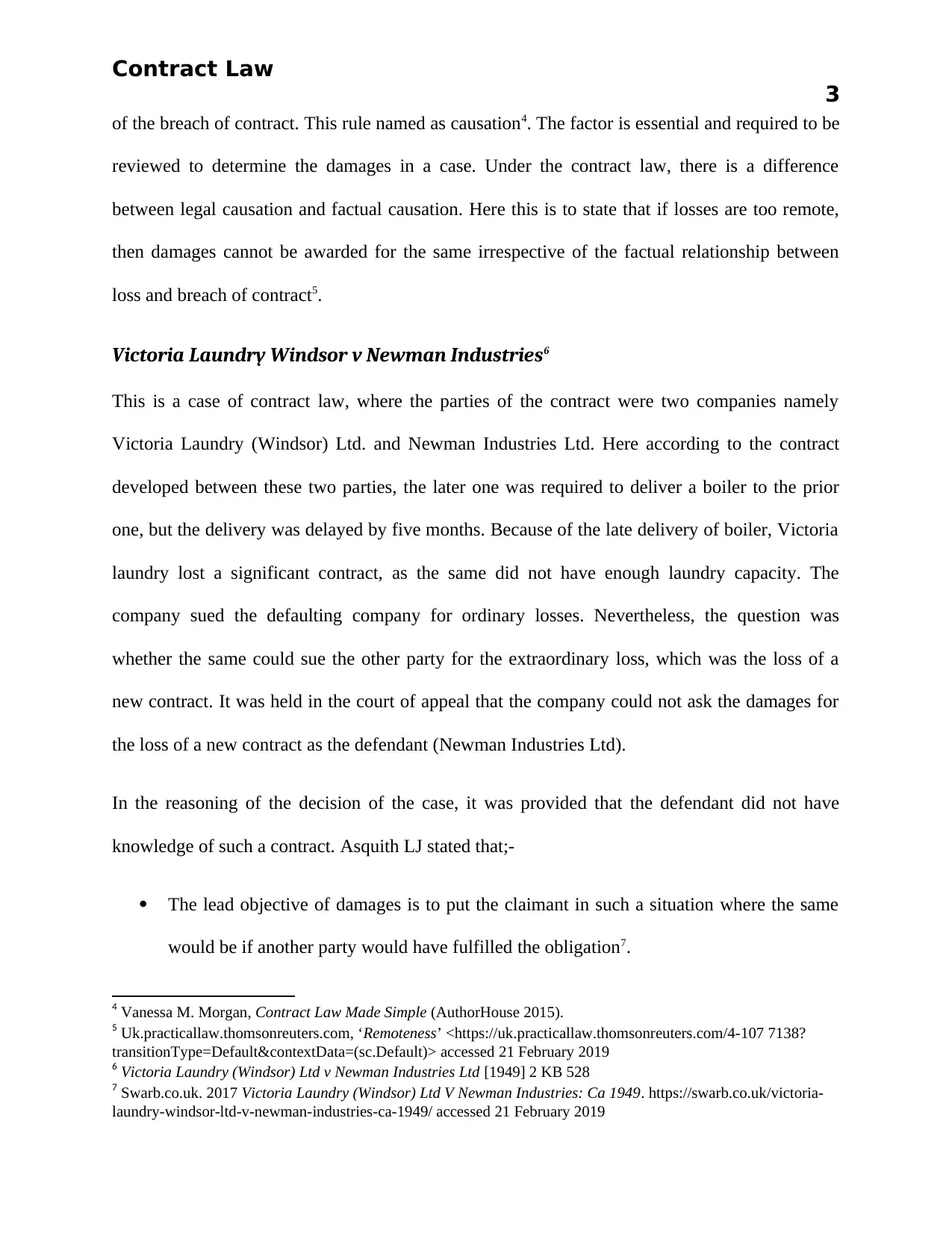
Contract Law
3
of the breach of contract. This rule named as causation4. The factor is essential and required to be
reviewed to determine the damages in a case. Under the contract law, there is a difference
between legal causation and factual causation. Here this is to state that if losses are too remote,
then damages cannot be awarded for the same irrespective of the factual relationship between
loss and breach of contract5.
Victoria Laundry Windsor v Newman Industries6
This is a case of contract law, where the parties of the contract were two companies namely
Victoria Laundry (Windsor) Ltd. and Newman Industries Ltd. Here according to the contract
developed between these two parties, the later one was required to deliver a boiler to the prior
one, but the delivery was delayed by five months. Because of the late delivery of boiler, Victoria
laundry lost a significant contract, as the same did not have enough laundry capacity. The
company sued the defaulting company for ordinary losses. Nevertheless, the question was
whether the same could sue the other party for the extraordinary loss, which was the loss of a
new contract. It was held in the court of appeal that the company could not ask the damages for
the loss of a new contract as the defendant (Newman Industries Ltd).
In the reasoning of the decision of the case, it was provided that the defendant did not have
knowledge of such a contract. Asquith LJ stated that;-
The lead objective of damages is to put the claimant in such a situation where the same
would be if another party would have fulfilled the obligation7.
4 Vanessa M. Morgan, Contract Law Made Simple (AuthorHouse 2015).
5 Uk.practicallaw.thomsonreuters.com, ‘Remoteness’ <https://uk.practicallaw.thomsonreuters.com/4-107 7138?
transitionType=Default&contextData=(sc.Default)> accessed 21 February 2019
6 Victoria Laundry (Windsor) Ltd v Newman Industries Ltd [1949] 2 KB 528
7 Swarb.co.uk. 2017 Victoria Laundry (Windsor) Ltd V Newman Industries: Ca 1949. https://swarb.co.uk/victoria-
laundry-windsor-ltd-v-newman-industries-ca-1949/ accessed 21 February 2019
3
of the breach of contract. This rule named as causation4. The factor is essential and required to be
reviewed to determine the damages in a case. Under the contract law, there is a difference
between legal causation and factual causation. Here this is to state that if losses are too remote,
then damages cannot be awarded for the same irrespective of the factual relationship between
loss and breach of contract5.
Victoria Laundry Windsor v Newman Industries6
This is a case of contract law, where the parties of the contract were two companies namely
Victoria Laundry (Windsor) Ltd. and Newman Industries Ltd. Here according to the contract
developed between these two parties, the later one was required to deliver a boiler to the prior
one, but the delivery was delayed by five months. Because of the late delivery of boiler, Victoria
laundry lost a significant contract, as the same did not have enough laundry capacity. The
company sued the defaulting company for ordinary losses. Nevertheless, the question was
whether the same could sue the other party for the extraordinary loss, which was the loss of a
new contract. It was held in the court of appeal that the company could not ask the damages for
the loss of a new contract as the defendant (Newman Industries Ltd).
In the reasoning of the decision of the case, it was provided that the defendant did not have
knowledge of such a contract. Asquith LJ stated that;-
The lead objective of damages is to put the claimant in such a situation where the same
would be if another party would have fulfilled the obligation7.
4 Vanessa M. Morgan, Contract Law Made Simple (AuthorHouse 2015).
5 Uk.practicallaw.thomsonreuters.com, ‘Remoteness’ <https://uk.practicallaw.thomsonreuters.com/4-107 7138?
transitionType=Default&contextData=(sc.Default)> accessed 21 February 2019
6 Victoria Laundry (Windsor) Ltd v Newman Industries Ltd [1949] 2 KB 528
7 Swarb.co.uk. 2017 Victoria Laundry (Windsor) Ltd V Newman Industries: Ca 1949. https://swarb.co.uk/victoria-
laundry-windsor-ltd-v-newman-industries-ca-1949/ accessed 21 February 2019
Paraphrase This Document
Need a fresh take? Get an instant paraphrase of this document with our AI Paraphraser
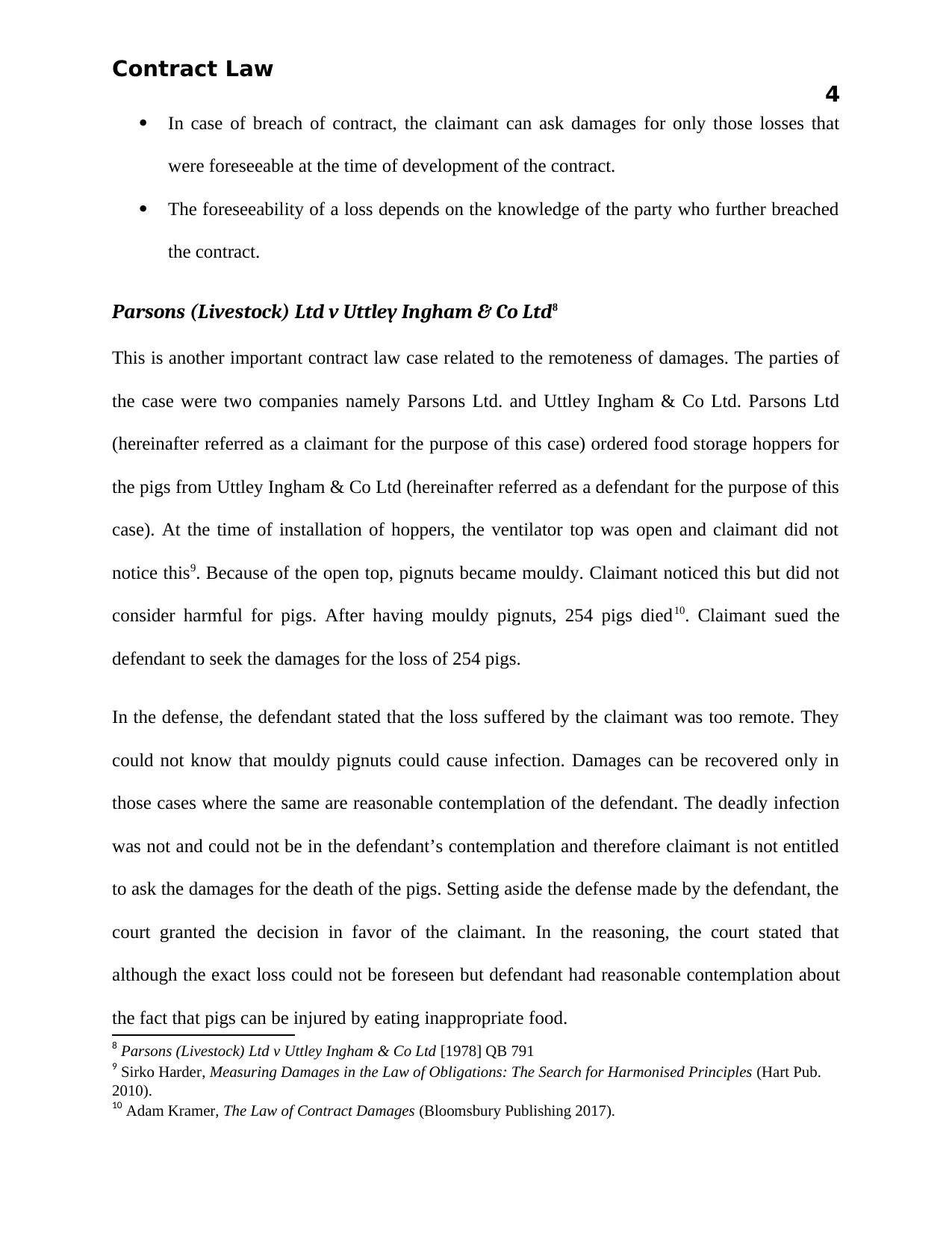
Contract Law
4
In case of breach of contract, the claimant can ask damages for only those losses that
were foreseeable at the time of development of the contract.
The foreseeability of a loss depends on the knowledge of the party who further breached
the contract.
Parsons (Livestock) Ltd v Uttley Ingham & Co Ltd8
This is another important contract law case related to the remoteness of damages. The parties of
the case were two companies namely Parsons Ltd. and Uttley Ingham & Co Ltd. Parsons Ltd
(hereinafter referred as a claimant for the purpose of this case) ordered food storage hoppers for
the pigs from Uttley Ingham & Co Ltd (hereinafter referred as a defendant for the purpose of this
case). At the time of installation of hoppers, the ventilator top was open and claimant did not
notice this9. Because of the open top, pignuts became mouldy. Claimant noticed this but did not
consider harmful for pigs. After having mouldy pignuts, 254 pigs died10. Claimant sued the
defendant to seek the damages for the loss of 254 pigs.
In the defense, the defendant stated that the loss suffered by the claimant was too remote. They
could not know that mouldy pignuts could cause infection. Damages can be recovered only in
those cases where the same are reasonable contemplation of the defendant. The deadly infection
was not and could not be in the defendant’s contemplation and therefore claimant is not entitled
to ask the damages for the death of the pigs. Setting aside the defense made by the defendant, the
court granted the decision in favor of the claimant. In the reasoning, the court stated that
although the exact loss could not be foreseen but defendant had reasonable contemplation about
the fact that pigs can be injured by eating inappropriate food.
8 Parsons (Livestock) Ltd v Uttley Ingham & Co Ltd [1978] QB 791
9 Sirko Harder, Measuring Damages in the Law of Obligations: The Search for Harmonised Principles (Hart Pub.
2010).
10 Adam Kramer, The Law of Contract Damages (Bloomsbury Publishing 2017).
4
In case of breach of contract, the claimant can ask damages for only those losses that
were foreseeable at the time of development of the contract.
The foreseeability of a loss depends on the knowledge of the party who further breached
the contract.
Parsons (Livestock) Ltd v Uttley Ingham & Co Ltd8
This is another important contract law case related to the remoteness of damages. The parties of
the case were two companies namely Parsons Ltd. and Uttley Ingham & Co Ltd. Parsons Ltd
(hereinafter referred as a claimant for the purpose of this case) ordered food storage hoppers for
the pigs from Uttley Ingham & Co Ltd (hereinafter referred as a defendant for the purpose of this
case). At the time of installation of hoppers, the ventilator top was open and claimant did not
notice this9. Because of the open top, pignuts became mouldy. Claimant noticed this but did not
consider harmful for pigs. After having mouldy pignuts, 254 pigs died10. Claimant sued the
defendant to seek the damages for the loss of 254 pigs.
In the defense, the defendant stated that the loss suffered by the claimant was too remote. They
could not know that mouldy pignuts could cause infection. Damages can be recovered only in
those cases where the same are reasonable contemplation of the defendant. The deadly infection
was not and could not be in the defendant’s contemplation and therefore claimant is not entitled
to ask the damages for the death of the pigs. Setting aside the defense made by the defendant, the
court granted the decision in favor of the claimant. In the reasoning, the court stated that
although the exact loss could not be foreseen but defendant had reasonable contemplation about
the fact that pigs can be injured by eating inappropriate food.
8 Parsons (Livestock) Ltd v Uttley Ingham & Co Ltd [1978] QB 791
9 Sirko Harder, Measuring Damages in the Law of Obligations: The Search for Harmonised Principles (Hart Pub.
2010).
10 Adam Kramer, The Law of Contract Damages (Bloomsbury Publishing 2017).
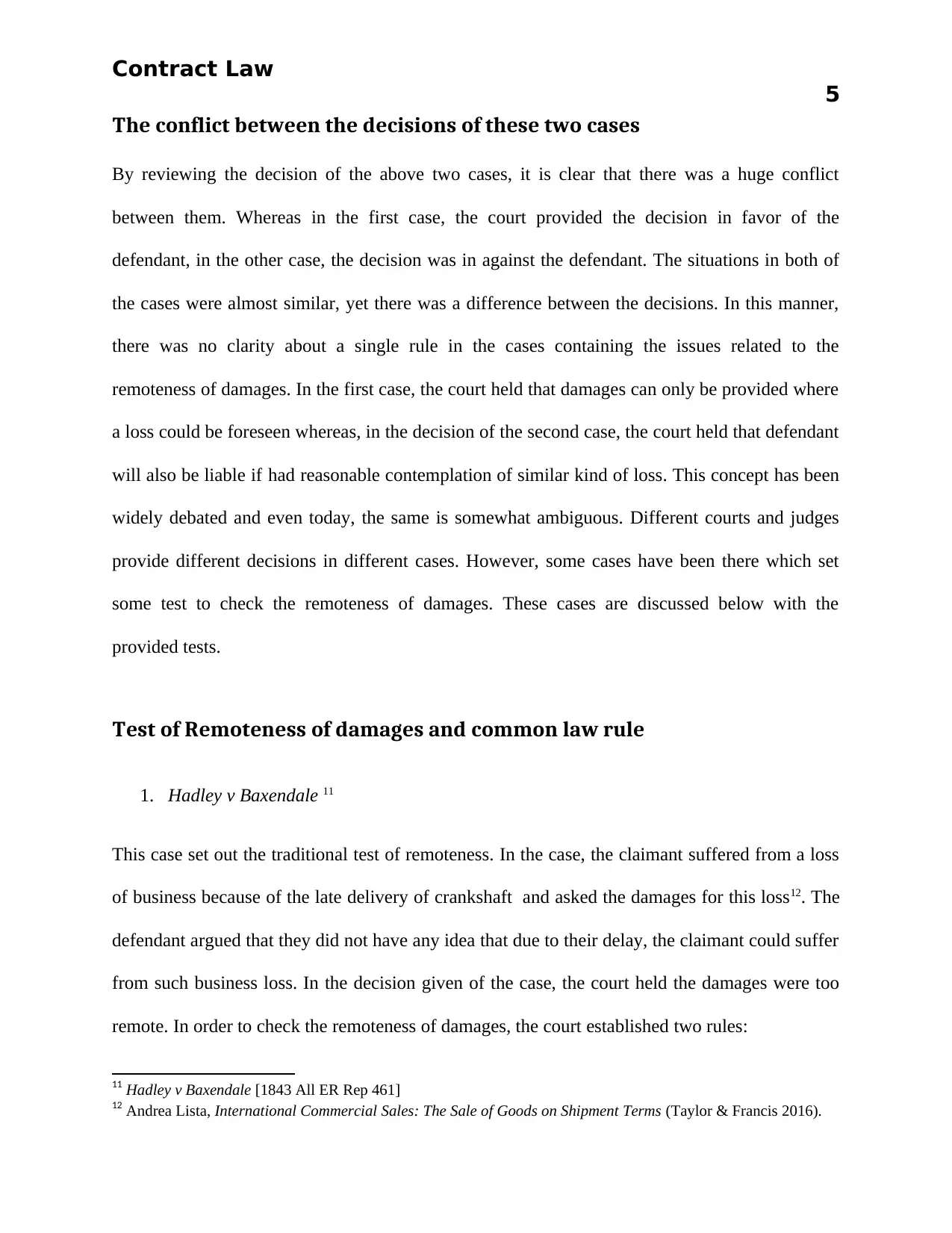
Contract Law
5
The conflict between the decisions of these two cases
By reviewing the decision of the above two cases, it is clear that there was a huge conflict
between them. Whereas in the first case, the court provided the decision in favor of the
defendant, in the other case, the decision was in against the defendant. The situations in both of
the cases were almost similar, yet there was a difference between the decisions. In this manner,
there was no clarity about a single rule in the cases containing the issues related to the
remoteness of damages. In the first case, the court held that damages can only be provided where
a loss could be foreseen whereas, in the decision of the second case, the court held that defendant
will also be liable if had reasonable contemplation of similar kind of loss. This concept has been
widely debated and even today, the same is somewhat ambiguous. Different courts and judges
provide different decisions in different cases. However, some cases have been there which set
some test to check the remoteness of damages. These cases are discussed below with the
provided tests.
Test of Remoteness of damages and common law rule
1. Hadley v Baxendale 11
This case set out the traditional test of remoteness. In the case, the claimant suffered from a loss
of business because of the late delivery of crankshaft and asked the damages for this loss12. The
defendant argued that they did not have any idea that due to their delay, the claimant could suffer
from such business loss. In the decision given of the case, the court held the damages were too
remote. In order to check the remoteness of damages, the court established two rules:
11 Hadley v Baxendale [1843 All ER Rep 461]
12 Andrea Lista, International Commercial Sales: The Sale of Goods on Shipment Terms (Taylor & Francis 2016).
5
The conflict between the decisions of these two cases
By reviewing the decision of the above two cases, it is clear that there was a huge conflict
between them. Whereas in the first case, the court provided the decision in favor of the
defendant, in the other case, the decision was in against the defendant. The situations in both of
the cases were almost similar, yet there was a difference between the decisions. In this manner,
there was no clarity about a single rule in the cases containing the issues related to the
remoteness of damages. In the first case, the court held that damages can only be provided where
a loss could be foreseen whereas, in the decision of the second case, the court held that defendant
will also be liable if had reasonable contemplation of similar kind of loss. This concept has been
widely debated and even today, the same is somewhat ambiguous. Different courts and judges
provide different decisions in different cases. However, some cases have been there which set
some test to check the remoteness of damages. These cases are discussed below with the
provided tests.
Test of Remoteness of damages and common law rule
1. Hadley v Baxendale 11
This case set out the traditional test of remoteness. In the case, the claimant suffered from a loss
of business because of the late delivery of crankshaft and asked the damages for this loss12. The
defendant argued that they did not have any idea that due to their delay, the claimant could suffer
from such business loss. In the decision given of the case, the court held the damages were too
remote. In order to check the remoteness of damages, the court established two rules:
11 Hadley v Baxendale [1843 All ER Rep 461]
12 Andrea Lista, International Commercial Sales: The Sale of Goods on Shipment Terms (Taylor & Francis 2016).
⊘ This is a preview!⊘
Do you want full access?
Subscribe today to unlock all pages.

Trusted by 1+ million students worldwide
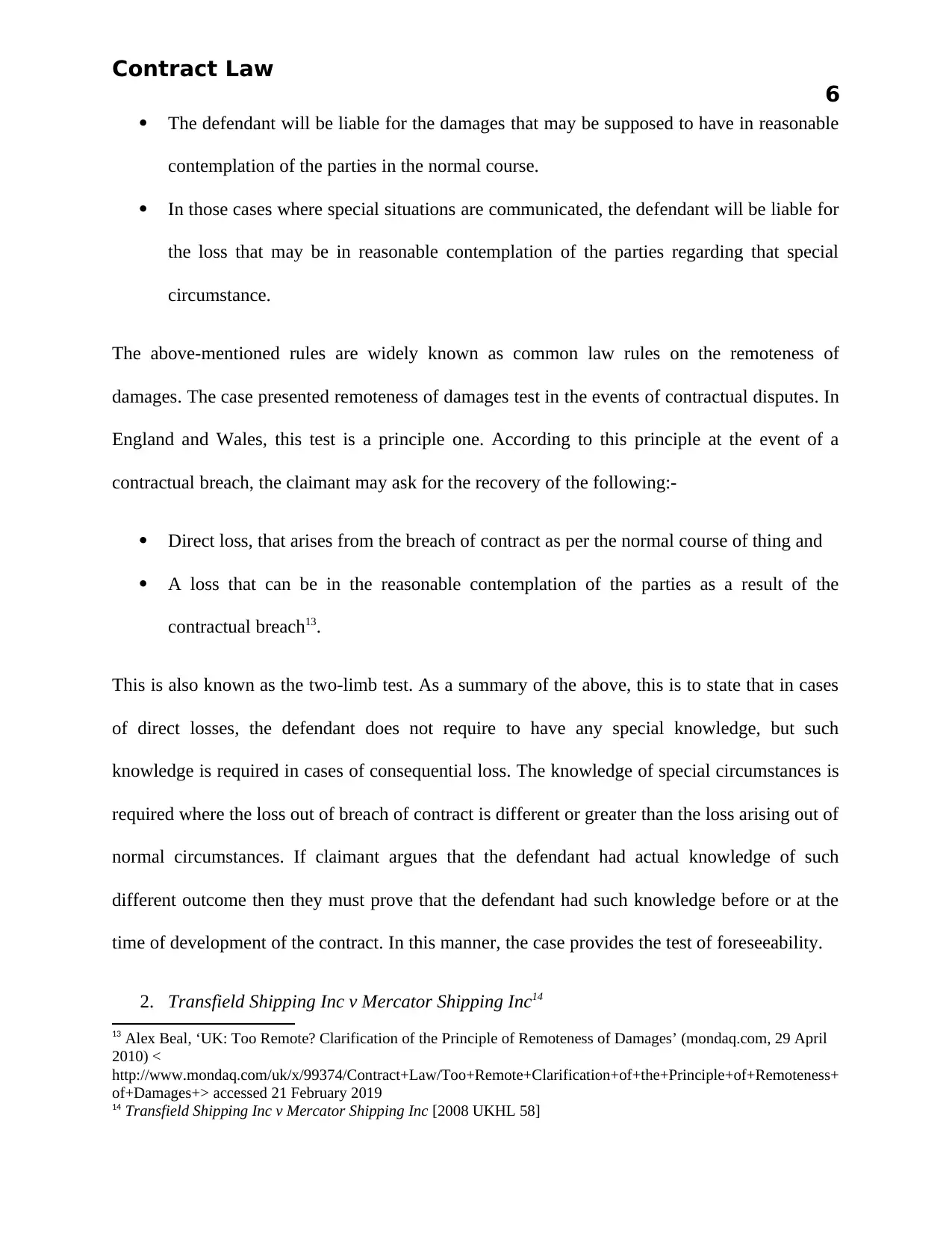
Contract Law
6
The defendant will be liable for the damages that may be supposed to have in reasonable
contemplation of the parties in the normal course.
In those cases where special situations are communicated, the defendant will be liable for
the loss that may be in reasonable contemplation of the parties regarding that special
circumstance.
The above-mentioned rules are widely known as common law rules on the remoteness of
damages. The case presented remoteness of damages test in the events of contractual disputes. In
England and Wales, this test is a principle one. According to this principle at the event of a
contractual breach, the claimant may ask for the recovery of the following:-
Direct loss, that arises from the breach of contract as per the normal course of thing and
A loss that can be in the reasonable contemplation of the parties as a result of the
contractual breach13.
This is also known as the two-limb test. As a summary of the above, this is to state that in cases
of direct losses, the defendant does not require to have any special knowledge, but such
knowledge is required in cases of consequential loss. The knowledge of special circumstances is
required where the loss out of breach of contract is different or greater than the loss arising out of
normal circumstances. If claimant argues that the defendant had actual knowledge of such
different outcome then they must prove that the defendant had such knowledge before or at the
time of development of the contract. In this manner, the case provides the test of foreseeability.
2. Transfield Shipping Inc v Mercator Shipping Inc14
13 Alex Beal, ‘UK: Too Remote? Clarification of the Principle of Remoteness of Damages’ (mondaq.com, 29 April
2010) <
http://www.mondaq.com/uk/x/99374/Contract+Law/Too+Remote+Clarification+of+the+Principle+of+Remoteness+
of+Damages+> accessed 21 February 2019
14 Transfield Shipping Inc v Mercator Shipping Inc [2008 UKHL 58]
6
The defendant will be liable for the damages that may be supposed to have in reasonable
contemplation of the parties in the normal course.
In those cases where special situations are communicated, the defendant will be liable for
the loss that may be in reasonable contemplation of the parties regarding that special
circumstance.
The above-mentioned rules are widely known as common law rules on the remoteness of
damages. The case presented remoteness of damages test in the events of contractual disputes. In
England and Wales, this test is a principle one. According to this principle at the event of a
contractual breach, the claimant may ask for the recovery of the following:-
Direct loss, that arises from the breach of contract as per the normal course of thing and
A loss that can be in the reasonable contemplation of the parties as a result of the
contractual breach13.
This is also known as the two-limb test. As a summary of the above, this is to state that in cases
of direct losses, the defendant does not require to have any special knowledge, but such
knowledge is required in cases of consequential loss. The knowledge of special circumstances is
required where the loss out of breach of contract is different or greater than the loss arising out of
normal circumstances. If claimant argues that the defendant had actual knowledge of such
different outcome then they must prove that the defendant had such knowledge before or at the
time of development of the contract. In this manner, the case provides the test of foreseeability.
2. Transfield Shipping Inc v Mercator Shipping Inc14
13 Alex Beal, ‘UK: Too Remote? Clarification of the Principle of Remoteness of Damages’ (mondaq.com, 29 April
2010) <
http://www.mondaq.com/uk/x/99374/Contract+Law/Too+Remote+Clarification+of+the+Principle+of+Remoteness+
of+Damages+> accessed 21 February 2019
14 Transfield Shipping Inc v Mercator Shipping Inc [2008 UKHL 58]
Paraphrase This Document
Need a fresh take? Get an instant paraphrase of this document with our AI Paraphraser
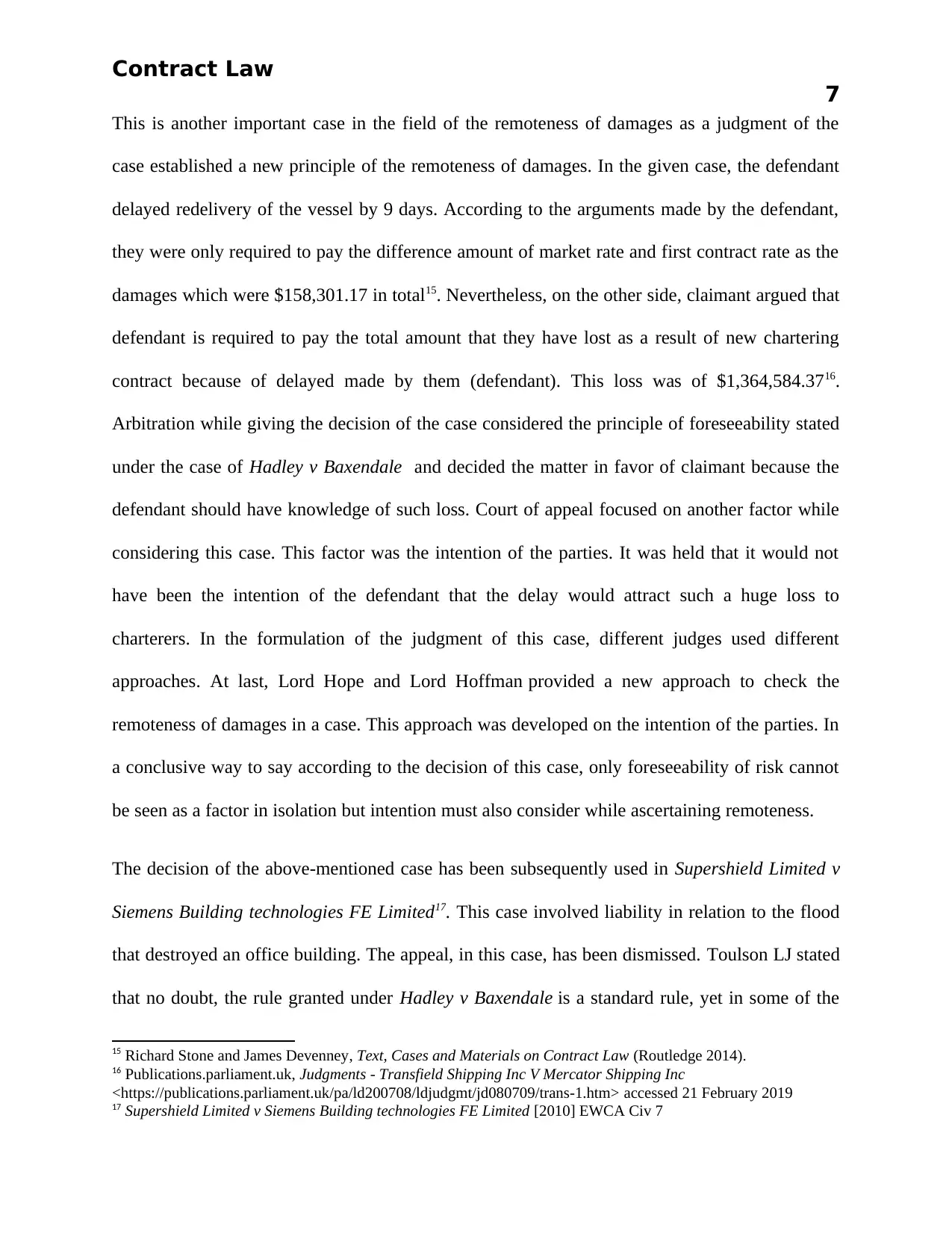
Contract Law
7
This is another important case in the field of the remoteness of damages as a judgment of the
case established a new principle of the remoteness of damages. In the given case, the defendant
delayed redelivery of the vessel by 9 days. According to the arguments made by the defendant,
they were only required to pay the difference amount of market rate and first contract rate as the
damages which were $158,301.17 in total15. Nevertheless, on the other side, claimant argued that
defendant is required to pay the total amount that they have lost as a result of new chartering
contract because of delayed made by them (defendant). This loss was of $1,364,584.3716.
Arbitration while giving the decision of the case considered the principle of foreseeability stated
under the case of Hadley v Baxendale and decided the matter in favor of claimant because the
defendant should have knowledge of such loss. Court of appeal focused on another factor while
considering this case. This factor was the intention of the parties. It was held that it would not
have been the intention of the defendant that the delay would attract such a huge loss to
charterers. In the formulation of the judgment of this case, different judges used different
approaches. At last, Lord Hope and Lord Hoffman provided a new approach to check the
remoteness of damages in a case. This approach was developed on the intention of the parties. In
a conclusive way to say according to the decision of this case, only foreseeability of risk cannot
be seen as a factor in isolation but intention must also consider while ascertaining remoteness.
The decision of the above-mentioned case has been subsequently used in Supershield Limited v
Siemens Building technologies FE Limited17. This case involved liability in relation to the flood
that destroyed an office building. The appeal, in this case, has been dismissed. Toulson LJ stated
that no doubt, the rule granted under Hadley v Baxendale is a standard rule, yet in some of the
15 Richard Stone and James Devenney, Text, Cases and Materials on Contract Law (Routledge 2014).
16 Publications.parliament.uk, Judgments - Transfield Shipping Inc V Mercator Shipping Inc
<https://publications.parliament.uk/pa/ld200708/ldjudgmt/jd080709/trans-1.htm> accessed 21 February 2019
17 Supershield Limited v Siemens Building technologies FE Limited [2010] EWCA Civ 7
7
This is another important case in the field of the remoteness of damages as a judgment of the
case established a new principle of the remoteness of damages. In the given case, the defendant
delayed redelivery of the vessel by 9 days. According to the arguments made by the defendant,
they were only required to pay the difference amount of market rate and first contract rate as the
damages which were $158,301.17 in total15. Nevertheless, on the other side, claimant argued that
defendant is required to pay the total amount that they have lost as a result of new chartering
contract because of delayed made by them (defendant). This loss was of $1,364,584.3716.
Arbitration while giving the decision of the case considered the principle of foreseeability stated
under the case of Hadley v Baxendale and decided the matter in favor of claimant because the
defendant should have knowledge of such loss. Court of appeal focused on another factor while
considering this case. This factor was the intention of the parties. It was held that it would not
have been the intention of the defendant that the delay would attract such a huge loss to
charterers. In the formulation of the judgment of this case, different judges used different
approaches. At last, Lord Hope and Lord Hoffman provided a new approach to check the
remoteness of damages in a case. This approach was developed on the intention of the parties. In
a conclusive way to say according to the decision of this case, only foreseeability of risk cannot
be seen as a factor in isolation but intention must also consider while ascertaining remoteness.
The decision of the above-mentioned case has been subsequently used in Supershield Limited v
Siemens Building technologies FE Limited17. This case involved liability in relation to the flood
that destroyed an office building. The appeal, in this case, has been dismissed. Toulson LJ stated
that no doubt, the rule granted under Hadley v Baxendale is a standard rule, yet in some of the
15 Richard Stone and James Devenney, Text, Cases and Materials on Contract Law (Routledge 2014).
16 Publications.parliament.uk, Judgments - Transfield Shipping Inc V Mercator Shipping Inc
<https://publications.parliament.uk/pa/ld200708/ldjudgmt/jd080709/trans-1.htm> accessed 21 February 2019
17 Supershield Limited v Siemens Building technologies FE Limited [2010] EWCA Civ 7
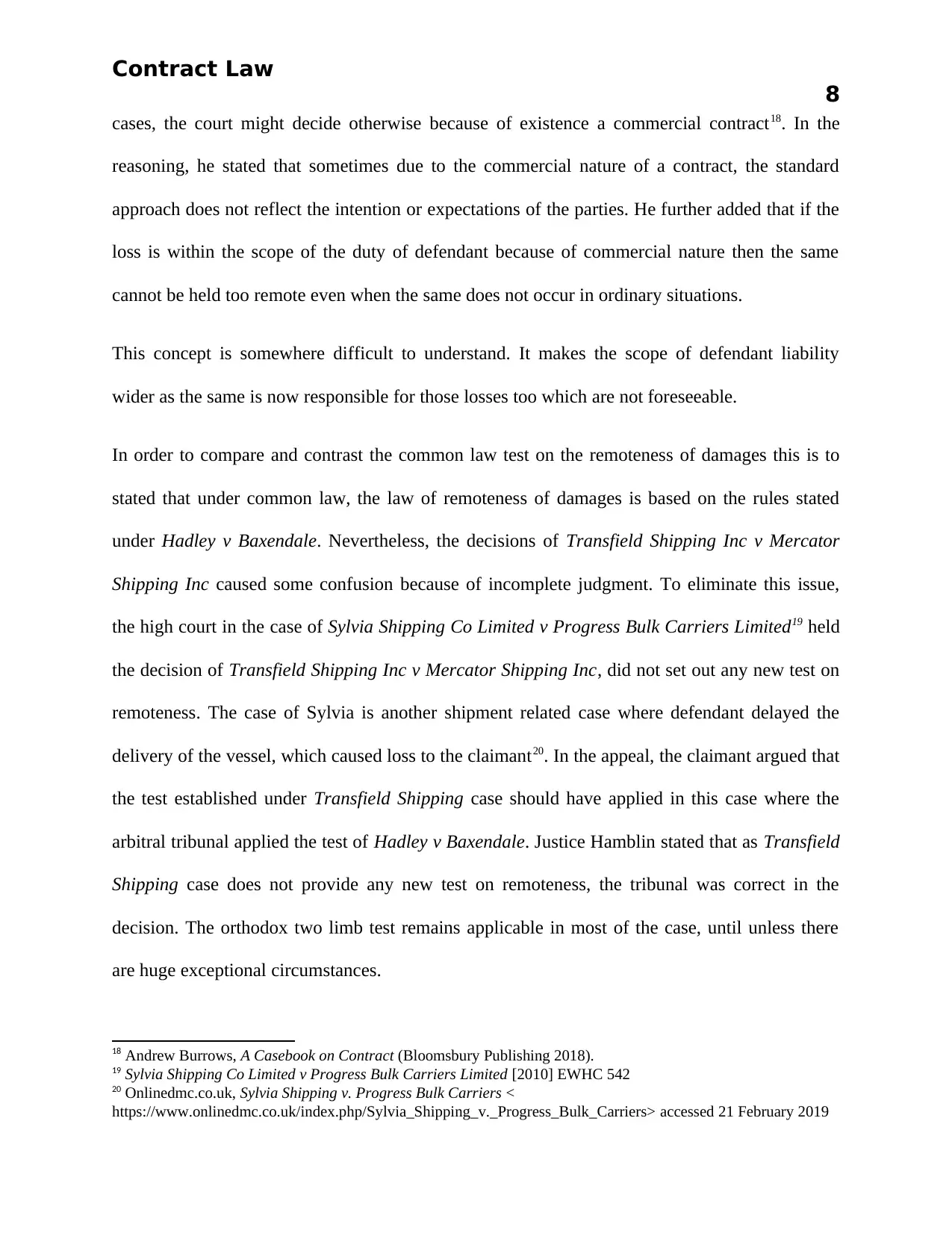
Contract Law
8
cases, the court might decide otherwise because of existence a commercial contract18. In the
reasoning, he stated that sometimes due to the commercial nature of a contract, the standard
approach does not reflect the intention or expectations of the parties. He further added that if the
loss is within the scope of the duty of defendant because of commercial nature then the same
cannot be held too remote even when the same does not occur in ordinary situations.
This concept is somewhere difficult to understand. It makes the scope of defendant liability
wider as the same is now responsible for those losses too which are not foreseeable.
In order to compare and contrast the common law test on the remoteness of damages this is to
stated that under common law, the law of remoteness of damages is based on the rules stated
under Hadley v Baxendale. Nevertheless, the decisions of Transfield Shipping Inc v Mercator
Shipping Inc caused some confusion because of incomplete judgment. To eliminate this issue,
the high court in the case of Sylvia Shipping Co Limited v Progress Bulk Carriers Limited19 held
the decision of Transfield Shipping Inc v Mercator Shipping Inc, did not set out any new test on
remoteness. The case of Sylvia is another shipment related case where defendant delayed the
delivery of the vessel, which caused loss to the claimant20. In the appeal, the claimant argued that
the test established under Transfield Shipping case should have applied in this case where the
arbitral tribunal applied the test of Hadley v Baxendale. Justice Hamblin stated that as Transfield
Shipping case does not provide any new test on remoteness, the tribunal was correct in the
decision. The orthodox two limb test remains applicable in most of the case, until unless there
are huge exceptional circumstances.
18 Andrew Burrows, A Casebook on Contract (Bloomsbury Publishing 2018).
19 Sylvia Shipping Co Limited v Progress Bulk Carriers Limited [2010] EWHC 542
20 Onlinedmc.co.uk, Sylvia Shipping v. Progress Bulk Carriers <
https://www.onlinedmc.co.uk/index.php/Sylvia_Shipping_v._Progress_Bulk_Carriers> accessed 21 February 2019
8
cases, the court might decide otherwise because of existence a commercial contract18. In the
reasoning, he stated that sometimes due to the commercial nature of a contract, the standard
approach does not reflect the intention or expectations of the parties. He further added that if the
loss is within the scope of the duty of defendant because of commercial nature then the same
cannot be held too remote even when the same does not occur in ordinary situations.
This concept is somewhere difficult to understand. It makes the scope of defendant liability
wider as the same is now responsible for those losses too which are not foreseeable.
In order to compare and contrast the common law test on the remoteness of damages this is to
stated that under common law, the law of remoteness of damages is based on the rules stated
under Hadley v Baxendale. Nevertheless, the decisions of Transfield Shipping Inc v Mercator
Shipping Inc caused some confusion because of incomplete judgment. To eliminate this issue,
the high court in the case of Sylvia Shipping Co Limited v Progress Bulk Carriers Limited19 held
the decision of Transfield Shipping Inc v Mercator Shipping Inc, did not set out any new test on
remoteness. The case of Sylvia is another shipment related case where defendant delayed the
delivery of the vessel, which caused loss to the claimant20. In the appeal, the claimant argued that
the test established under Transfield Shipping case should have applied in this case where the
arbitral tribunal applied the test of Hadley v Baxendale. Justice Hamblin stated that as Transfield
Shipping case does not provide any new test on remoteness, the tribunal was correct in the
decision. The orthodox two limb test remains applicable in most of the case, until unless there
are huge exceptional circumstances.
18 Andrew Burrows, A Casebook on Contract (Bloomsbury Publishing 2018).
19 Sylvia Shipping Co Limited v Progress Bulk Carriers Limited [2010] EWHC 542
20 Onlinedmc.co.uk, Sylvia Shipping v. Progress Bulk Carriers <
https://www.onlinedmc.co.uk/index.php/Sylvia_Shipping_v._Progress_Bulk_Carriers> accessed 21 February 2019
⊘ This is a preview!⊘
Do you want full access?
Subscribe today to unlock all pages.

Trusted by 1+ million students worldwide
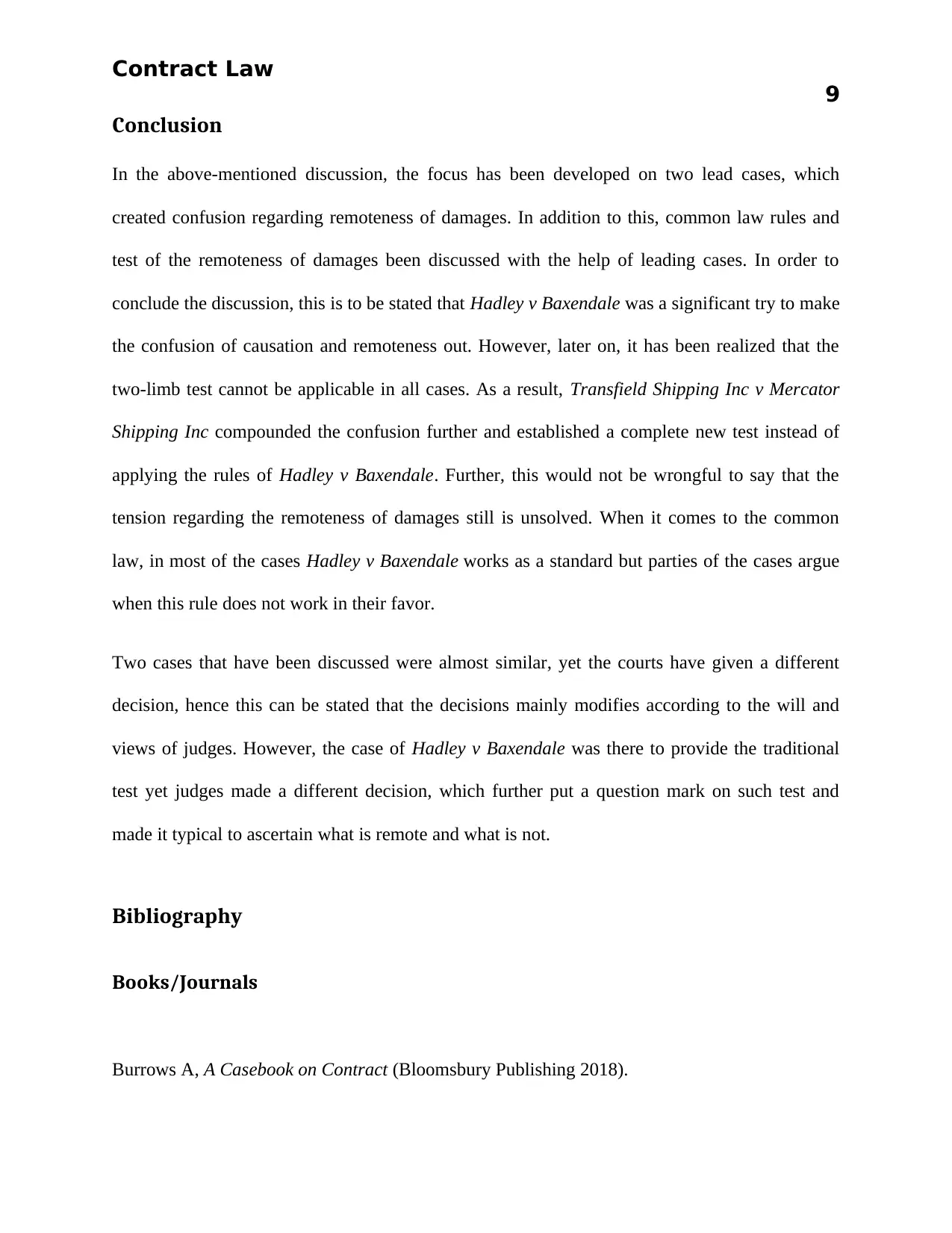
Contract Law
9
Conclusion
In the above-mentioned discussion, the focus has been developed on two lead cases, which
created confusion regarding remoteness of damages. In addition to this, common law rules and
test of the remoteness of damages been discussed with the help of leading cases. In order to
conclude the discussion, this is to be stated that Hadley v Baxendale was a significant try to make
the confusion of causation and remoteness out. However, later on, it has been realized that the
two-limb test cannot be applicable in all cases. As a result, Transfield Shipping Inc v Mercator
Shipping Inc compounded the confusion further and established a complete new test instead of
applying the rules of Hadley v Baxendale. Further, this would not be wrongful to say that the
tension regarding the remoteness of damages still is unsolved. When it comes to the common
law, in most of the cases Hadley v Baxendale works as a standard but parties of the cases argue
when this rule does not work in their favor.
Two cases that have been discussed were almost similar, yet the courts have given a different
decision, hence this can be stated that the decisions mainly modifies according to the will and
views of judges. However, the case of Hadley v Baxendale was there to provide the traditional
test yet judges made a different decision, which further put a question mark on such test and
made it typical to ascertain what is remote and what is not.
Bibliography
Books/Journals
Burrows A, A Casebook on Contract (Bloomsbury Publishing 2018).
9
Conclusion
In the above-mentioned discussion, the focus has been developed on two lead cases, which
created confusion regarding remoteness of damages. In addition to this, common law rules and
test of the remoteness of damages been discussed with the help of leading cases. In order to
conclude the discussion, this is to be stated that Hadley v Baxendale was a significant try to make
the confusion of causation and remoteness out. However, later on, it has been realized that the
two-limb test cannot be applicable in all cases. As a result, Transfield Shipping Inc v Mercator
Shipping Inc compounded the confusion further and established a complete new test instead of
applying the rules of Hadley v Baxendale. Further, this would not be wrongful to say that the
tension regarding the remoteness of damages still is unsolved. When it comes to the common
law, in most of the cases Hadley v Baxendale works as a standard but parties of the cases argue
when this rule does not work in their favor.
Two cases that have been discussed were almost similar, yet the courts have given a different
decision, hence this can be stated that the decisions mainly modifies according to the will and
views of judges. However, the case of Hadley v Baxendale was there to provide the traditional
test yet judges made a different decision, which further put a question mark on such test and
made it typical to ascertain what is remote and what is not.
Bibliography
Books/Journals
Burrows A, A Casebook on Contract (Bloomsbury Publishing 2018).
Paraphrase This Document
Need a fresh take? Get an instant paraphrase of this document with our AI Paraphraser
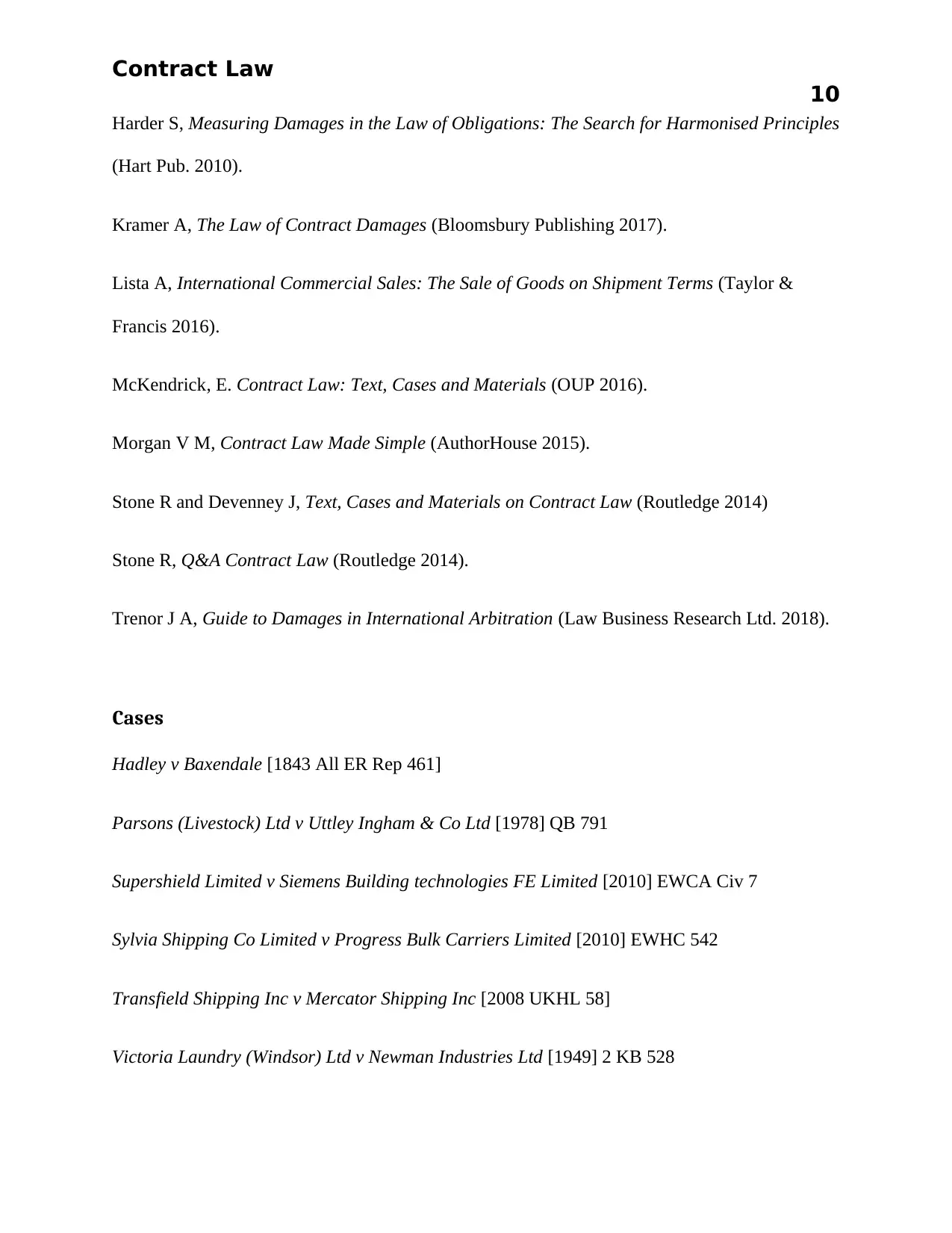
Contract Law
10
Harder S, Measuring Damages in the Law of Obligations: The Search for Harmonised Principles
(Hart Pub. 2010).
Kramer A, The Law of Contract Damages (Bloomsbury Publishing 2017).
Lista A, International Commercial Sales: The Sale of Goods on Shipment Terms (Taylor &
Francis 2016).
McKendrick, E. Contract Law: Text, Cases and Materials (OUP 2016).
Morgan V M, Contract Law Made Simple (AuthorHouse 2015).
Stone R and Devenney J, Text, Cases and Materials on Contract Law (Routledge 2014)
Stone R, Q&A Contract Law (Routledge 2014).
Trenor J A, Guide to Damages in International Arbitration (Law Business Research Ltd. 2018).
Cases
Hadley v Baxendale [1843 All ER Rep 461]
Parsons (Livestock) Ltd v Uttley Ingham & Co Ltd [1978] QB 791
Supershield Limited v Siemens Building technologies FE Limited [2010] EWCA Civ 7
Sylvia Shipping Co Limited v Progress Bulk Carriers Limited [2010] EWHC 542
Transfield Shipping Inc v Mercator Shipping Inc [2008 UKHL 58]
Victoria Laundry (Windsor) Ltd v Newman Industries Ltd [1949] 2 KB 528
10
Harder S, Measuring Damages in the Law of Obligations: The Search for Harmonised Principles
(Hart Pub. 2010).
Kramer A, The Law of Contract Damages (Bloomsbury Publishing 2017).
Lista A, International Commercial Sales: The Sale of Goods on Shipment Terms (Taylor &
Francis 2016).
McKendrick, E. Contract Law: Text, Cases and Materials (OUP 2016).
Morgan V M, Contract Law Made Simple (AuthorHouse 2015).
Stone R and Devenney J, Text, Cases and Materials on Contract Law (Routledge 2014)
Stone R, Q&A Contract Law (Routledge 2014).
Trenor J A, Guide to Damages in International Arbitration (Law Business Research Ltd. 2018).
Cases
Hadley v Baxendale [1843 All ER Rep 461]
Parsons (Livestock) Ltd v Uttley Ingham & Co Ltd [1978] QB 791
Supershield Limited v Siemens Building technologies FE Limited [2010] EWCA Civ 7
Sylvia Shipping Co Limited v Progress Bulk Carriers Limited [2010] EWHC 542
Transfield Shipping Inc v Mercator Shipping Inc [2008 UKHL 58]
Victoria Laundry (Windsor) Ltd v Newman Industries Ltd [1949] 2 KB 528
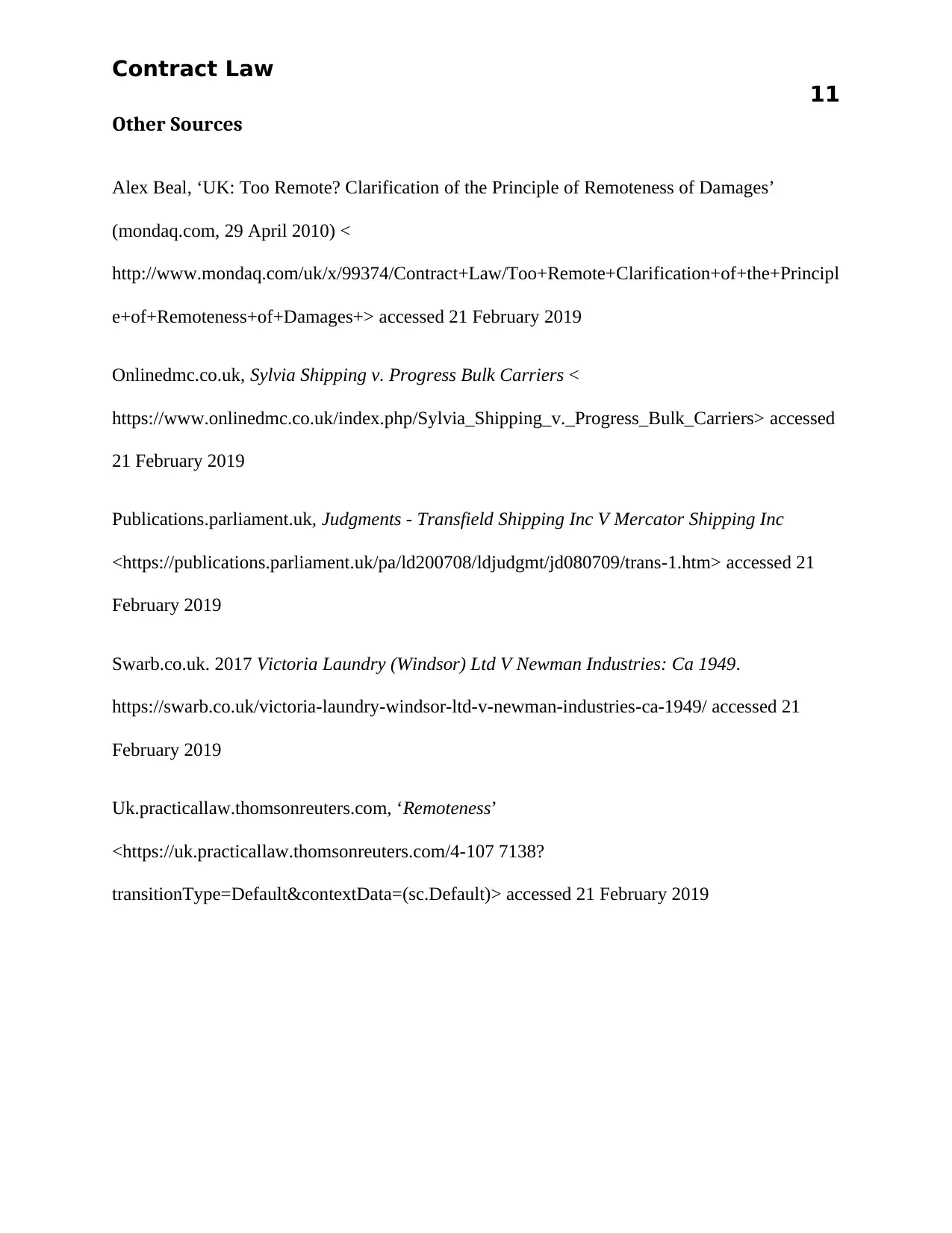
Contract Law
11
Other Sources
Alex Beal, ‘UK: Too Remote? Clarification of the Principle of Remoteness of Damages’
(mondaq.com, 29 April 2010) <
http://www.mondaq.com/uk/x/99374/Contract+Law/Too+Remote+Clarification+of+the+Principl
e+of+Remoteness+of+Damages+> accessed 21 February 2019
Onlinedmc.co.uk, Sylvia Shipping v. Progress Bulk Carriers <
https://www.onlinedmc.co.uk/index.php/Sylvia_Shipping_v._Progress_Bulk_Carriers> accessed
21 February 2019
Publications.parliament.uk, Judgments - Transfield Shipping Inc V Mercator Shipping Inc
<https://publications.parliament.uk/pa/ld200708/ldjudgmt/jd080709/trans-1.htm> accessed 21
February 2019
Swarb.co.uk. 2017 Victoria Laundry (Windsor) Ltd V Newman Industries: Ca 1949.
https://swarb.co.uk/victoria-laundry-windsor-ltd-v-newman-industries-ca-1949/ accessed 21
February 2019
Uk.practicallaw.thomsonreuters.com, ‘Remoteness’
<https://uk.practicallaw.thomsonreuters.com/4-107 7138?
transitionType=Default&contextData=(sc.Default)> accessed 21 February 2019
11
Other Sources
Alex Beal, ‘UK: Too Remote? Clarification of the Principle of Remoteness of Damages’
(mondaq.com, 29 April 2010) <
http://www.mondaq.com/uk/x/99374/Contract+Law/Too+Remote+Clarification+of+the+Principl
e+of+Remoteness+of+Damages+> accessed 21 February 2019
Onlinedmc.co.uk, Sylvia Shipping v. Progress Bulk Carriers <
https://www.onlinedmc.co.uk/index.php/Sylvia_Shipping_v._Progress_Bulk_Carriers> accessed
21 February 2019
Publications.parliament.uk, Judgments - Transfield Shipping Inc V Mercator Shipping Inc
<https://publications.parliament.uk/pa/ld200708/ldjudgmt/jd080709/trans-1.htm> accessed 21
February 2019
Swarb.co.uk. 2017 Victoria Laundry (Windsor) Ltd V Newman Industries: Ca 1949.
https://swarb.co.uk/victoria-laundry-windsor-ltd-v-newman-industries-ca-1949/ accessed 21
February 2019
Uk.practicallaw.thomsonreuters.com, ‘Remoteness’
<https://uk.practicallaw.thomsonreuters.com/4-107 7138?
transitionType=Default&contextData=(sc.Default)> accessed 21 February 2019
⊘ This is a preview!⊘
Do you want full access?
Subscribe today to unlock all pages.

Trusted by 1+ million students worldwide
1 out of 12
Related Documents
Your All-in-One AI-Powered Toolkit for Academic Success.
+13062052269
info@desklib.com
Available 24*7 on WhatsApp / Email
![[object Object]](/_next/static/media/star-bottom.7253800d.svg)
Unlock your academic potential
Copyright © 2020–2026 A2Z Services. All Rights Reserved. Developed and managed by ZUCOL.




